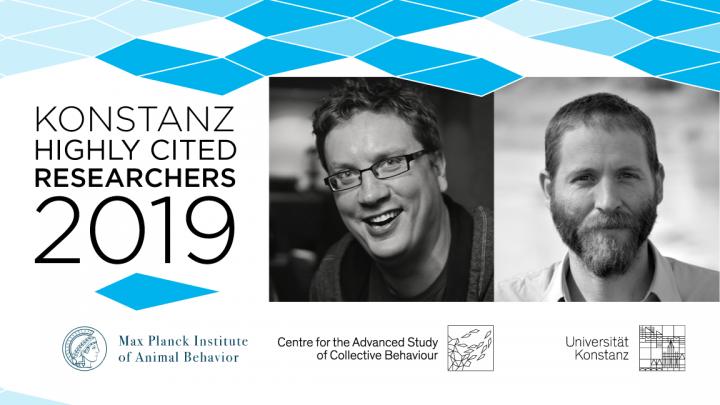
Credit: Gabriel Miller and Tobit Dehnen
Two collective behaviour researchers, Professor Iain Couzin and Dr Damien Farine, have been named in the Highly Cited Researchers 2019 list from the Web of Science Group. The highly anticipated list identifies scientists and social scientists who produced multiple papers ranking in the top 1% by citations for their field and year of publication, underlining the influence the researchers have had in their fields and signalling the impact of interdisciplinary collective behaviour research on the broader scientific discussions of our time.
Couzin and Farine – from the Max Planck Institute of Animal Behavior (MPIAB) in Konstanz and the Centre for the Advanced Study of Collective Behaviour (CASCB), one of the Clusters of Excellence at the University of Konstanz – were both named in the HCR list’s “cross-field” category, which recognizes individuals who publish highly cited papers (in the top 1%) across several fields.
Their combined work involves applying cross-disciplinary approaches such as statistical physics, computer vision, and mathematical modelling to understand collective animal behaviour – from revealing the mechanisms underpinning how collectives function to how social behaviour changes the rules of ecology and evolution.
“Two University of Konstanz researchers have been named on the 2019 Highly Cited Researchers List,” says Professor Kerstin Krieglstein, rector of the University of Konstanz. “That both are international and working in one of our two Clusters of Excellence, The Centre for the Advanced Study of Collective Behaviour, leaves no doubt that Konstanz is becoming a global hub for the study of collectives.”
Iain Couzin
Couzin, the Director of the MPIAB in Konstanz as well as Chair of Biodiversity and Collective Behaviour and Co-Director of the CASCB at the University of Konstanz, has made pioneering contributions into leadership, decision-making and collective sensing in animal groups. Couzin led the founding of two new institutes in Konstanz that focus on the study of group behaviour in humans and animals: the DFG Cluster of Excellence Centre for the Advanced Study of Collective Behaviour and the Max Planck Institute of Animal Behaviour. He was also a key player in establishing a 32-million-euro purpose-built facility for collective behaviour – the Centre for Visual Computing of Collectives – which will be completed at the University of Konstanz in 2021.
Damien Farine
A principal investigator in both the Department of Collective Behaviour at the MPIAB and the CASCB, Farine is a researcher emerging at the forefront of the study of social and collective behaviours in wild populations. This year he was awarded a 5-year ERC Starting Grant (1.5 million euros) by the European Research Council and has 11 papers recognized as being Highly Cited.
Facts:
- The 2019 list includes over 6,216 Highly Cited Researchers in 21 fields of science and social science, and places Germany fourth on the list of countries with the most Highly Cited Researchers.
- This year’s list includes 23 Nobel laureates, including three announced this year.
- The Web of Science serves as the basis for regular listings of researchers whose citation records position them in the top 1% by citations for their field and year.
- The full Highly Cited Researchers 2019 list can be found online at: http://recognition.
webofsciencegroup. com/ awards/ highly-cited/ 2019/ - Further information: https:/
/ www. campus. uni-konstanz. de/ wissenschaft/ the-konstanz-scientists-among-the-world-s-most-influential
###
Note to editors:
You can download photos here:
Portrait of Iain Couzin (credit: Gabriel Miller): https:/
Portrait of Damien Farine (credit: Tobit Dehnen): https:/
Caption: Iain Couzin, the Director of the the Max Planck Institute of Animal Behavior (MPIAB) in Konstanz as well as Chair of Biodiversity and Collective Behaviour and Co-Director of the Centre for the Advanced Study of Collective Behaviour at the University of Konstanz, and Damien Farine, a principal investigator in both the Department of Collective Behaviour at the MPIAB and the CASCB, have been named Highly Cited Researchers, according to the Highly Cited Researchers 2019 list from the Web of Science Group, released on 19 November 2019.
Media Contact
Julia Wandt
[email protected]




